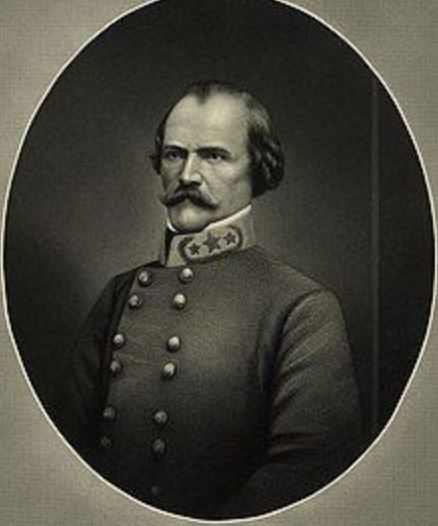Albert Sidney Johnston was a significant figure in American history, particularly during the Civil War. Known for his military prowess and leadership, Johnston’s life was marked by service to his country in various capacities, ultimately leading to his role as a general in the Confederate Army. This article will explore the life of Albert Sidney Johnston, his military career, and his enduring legacy.
Early Life and Military Career
Albert Sidney Johnston was born on February 2, 1803, in Washington, Kentucky. He grew up in a family with strong military traditions, which influenced his decision to pursue a career in the armed forces. In 1826, Johnston graduated from the United States Military Academy at West Point, where he was a classmate of future Confederate President Jefferson Davis.
Johnston’s early military career saw him serve in the Black Hawk War, where he quickly demonstrated his leadership abilities. He later participated in the Texas Revolution, fighting for Texas’s independence from Mexico. After Texas gained its independence, Johnston became the Secretary of War for the Republic of Texas, further solidifying his reputation as a capable military leader.
Service in the United States Army
After Texas was annexed by the United States, Johnston continued his military service in the U.S. Army. He served in the Mexican-American War, where his bravery and tactical skills earned him commendations. Johnston’s reputation grew, and he became known as one of the most capable officers in the U.S. Army.
In 1857, Johnston was appointed to lead the Utah Expedition, a mission to quell a potential rebellion by Mormon settlers in Utah Territory. His successful handling of the situation without major bloodshed showcased his ability to maintain peace and order in difficult circumstances.

The Civil War and Confederate Service
When the Civil War broke out in 1861, Albert Sidney Johnston faced a difficult decision. Although he had served with distinction in the U.S. Army, his loyalty to his home state of Texas and the Southern cause led him to join the Confederacy. Jefferson Davis, recognizing Johnston’s military talents, appointed him as a full general in the Confederate Army, one of the highest ranks available.
Johnston was given command of the Western Department, a vast and strategically important region. His task was to defend the Confederacy’s western frontiers from Union advances. Despite facing challenges such as limited resources and manpower, Johnston worked tirelessly to organize and strengthen Confederate forces in the region.
The Battle of Shiloh
Albert Sidney Johnston’s most significant and tragic moment came during the Battle of Shiloh, fought on April 6-7, 1862, in southwestern Tennessee. Johnston’s forces launched a surprise attack on Union troops led by General Ulysses S. Grant. The initial assault was successful, with Confederate forces pushing the Union army back and gaining ground.
However, the battle took a deadly turn for Johnston. On the afternoon of April 6, while leading a charge, Johnston was struck by a bullet in the leg. The wound severed an artery, and Johnston, unaware of the severity of the injury, continued to lead his men. Tragically, he bled to death within minutes, becoming the highest-ranking officer on either side to die in combat during the Civil War.
Johnston’s death was a significant blow to the Confederate cause. Many historians believe that had Johnston lived, the outcome of the Battle of Shiloh—and perhaps even the course of the war—could have been different. His leadership and strategic vision were sorely missed by the Confederacy in the subsequent years of the conflict.
Legacy and Commemoration
Albert Sidney Johnston’s legacy is one of bravery, leadership, and dedication to his cause. Despite his untimely death, Johnston is remembered as one of the most capable generals of the Civil War. His efforts in the Western Theater of the war, although ultimately unsuccessful, demonstrated his commitment to the Confederacy and his belief in its cause.
Johnston is commemorated in various ways throughout the United States. Statues, monuments, and memorials dedicated to his memory can be found in several states, particularly in Texas, where he is regarded as a hero. The Albert Sidney Johnston chapter of the United Daughters of the Confederacy also works to preserve his memory and educate future generations about his life and service.
Controversy and Modern Perspectives
In recent years, the legacy of Confederate leaders like Albert Sidney Johnston has come under scrutiny. The debate over the commemoration of Confederate figures reflects broader discussions about how history is remembered and the values that are upheld in public spaces.
While Johnston’s military achievements are recognized, his role in defending the Confederacy—a government founded on the preservation of slavery—raises important questions about how he and other Confederate leaders should be remembered. Some argue that his monuments should remain as historical artifacts, while others believe they should be removed or recontextualized to reflect a more inclusive understanding of history.
Albert Sidney Johnston was a man of complex loyalties and remarkable military skill. His service to both the United States and the Confederacy reflects the divided nature of the country during the Civil War. Although his life was cut short at the Battle of Shiloh, Johnston’s legacy endures as a symbol of the challenges and contradictions of a nation at war with itself.
Understanding the life of Albert Sidney Johnston provides insight into the broader narrative of the Civil War and the individuals who shaped its course. As history continues to be reexamined, Johnston’s story serves as a reminder of the complexities of leadership, loyalty, and the lasting impact of conflict.
